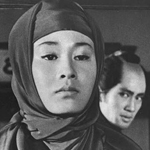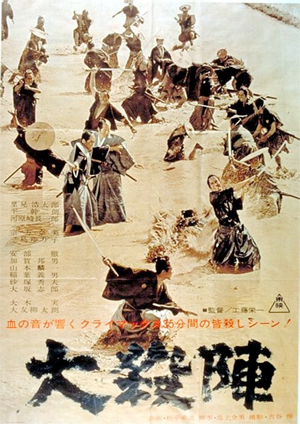 Recently I had a stressful week I knew would be spent largely in hospital waiting rooms, so I thought real hard about what kind of movie I could rent that would be comforting to me if I ever got home to watch it. I could’ve gone for a movie I’ve already seen a million times and love, like DIE HARD or something. For some reason my heart said “old samurai movie.”
Recently I had a stressful week I knew would be spent largely in hospital waiting rooms, so I thought real hard about what kind of movie I could rent that would be comforting to me if I ever got home to watch it. I could’ve gone for a movie I’ve already seen a million times and love, like DIE HARD or something. For some reason my heart said “old samurai movie.”
I don’t know for sure what it is about these things that they appeal to me so much. In a way they’re difficult: I’m completely ignorant of the historical periods depicted, and I have a hard time keeping track of some of the character names and terminology. But in another sense they’re simple. The heroes are always working from a code. They explain the code and then they struggle to follow it, even though they’re living in a dishonorable world, working in a dishonorable system. For them there’s no choice but to follow the code, because they know anyone who doesn’t is an asshole. And then there’s a big sword fight.
There’s usually alot of quiet moments in these movies, rarely an overbearing score, and there’s the simple black and white imagery. Kinda calming to me. So I chose to soothe my soul with a movie about the great killing, and I’m afraid that’s as in “the huge killing,” not “the really good killing.”
 I chose THE GREAT KILLING because the director, Eiichi Kudo, did THE THIRTEEN ASSASSINS. Not the Takashi Miike one, that one was done by Takashi Miike. Kudo did the original 1963 version, and followed it the next year with this pretty similar one. The people are fed up with the fucking government and hatch a plot to stop the wicked Sakai from ascending the ranks. There is lots of politics, recruiting and strategy, and then eventually it gets to the big day when the shit goes down, the targets are traveling and the conspirators (some of them working within the government to manipulate the security situation) try to execute their ambush plan.
I chose THE GREAT KILLING because the director, Eiichi Kudo, did THE THIRTEEN ASSASSINS. Not the Takashi Miike one, that one was done by Takashi Miike. Kudo did the original 1963 version, and followed it the next year with this pretty similar one. The people are fed up with the fucking government and hatch a plot to stop the wicked Sakai from ascending the ranks. There is lots of politics, recruiting and strategy, and then eventually it gets to the big day when the shit goes down, the targets are traveling and the conspirators (some of them working within the government to manipulate the security situation) try to execute their ambush plan.
And then then the shit hits the fan. There’s a big battle with many warriors involved and many swords flying in every possible direction. It’s brutal. Some of our heroes (most? all?) end up dead in piles, covered in sand and flies.
One interesting difference from Kudo’s previous movie: instead of plotting to kill the evil guy their plan is to kill one of his allies, knowing that no one else will give him the promotion he needs to become more powerful. It’s all about who you know, you know? We also see more of the government’s side of things, the raids to find conspirators, the interrogations. But it’s hard to make a samurai talk.
Ironically it’s partly this heavy-handed law enforcement that’s forcing the rebellion in the first place (along with farmers being overtaxed so they can’t afford to live). If you have any honor and you see what’s going on here you’re not gonna be able to stand idly by. Conspirators are being forced to kill themselves, innocents are running in terror trying not to get swept up with them. A man sees his wife get slashed with a sword, and is chased off, doesn’t even know if she survived. Shit is bad.
In a weird way the portrayal of the conspirators reminds me of ’60s radicals. They’re shown to be right in their goals, but also made to seem pretty scary. They can be cold with each other and their fervor for dying for the cause is intense. They recruit people for the revolution and then feel bad for getting them into such danger.
And (like Ving Rhames’s character in PATTY HEARST) there are some total bastards in their ranks. One great scene involves a so-called samurai revealing his opportunistic plan to rat everybody out. He thinks they’ve already lost and decides that saving his ass is more important than sacrificing for the people. That motherfucker gets what’s coming to him. Then there’s the total psycho who becomes a monk, insists God is on his side, and rapes one of the true believers (a very commanding force in the movie and then this prick just crushes her). It’s interesting, we’re used to seeing these type of characters who show the dark side of organized religion, or how bad people can twist religion to get their way, but it’s usually people using Christianity. Here’s what could be seen a damning portrait of a religion generally considered more gentle and innocent than the big ones we have here. Pretty ballsy there, Kudo.
There’s a real palpable feeling of dread about having to die for what’s right. They’re not happy about it. They’d rather not be martyrs, but it’s that damn code. They can’t see it any other way. The most haunting thing in the movie is the gorgeous shot of one samurai walking to the ambush, a tiny robed figure moving toward the foggy horizon and, we’re pretty sure, his death. And he hears the echoes – memories – of his kids calling “Daddy!” We saw these kids earlier, fighting and goofing off when it was time for bed, part of a nice family who gave shelter to another one of the conspirators. And they’ll probly never see either of these men again.
(In fact, one review I read makes me think this guy actually killed his family off screen before he left. If so I missed the hints.)
Parts of the sword fights are shot handheld, shakycam if you will. But to bring it back to the ’60s comparison this gives it sort of the immediacy of Haskell Wexler ’68 Democratic Convention footage more than BOURNE ULTIMATUM car chases. Since it’s used for certain shots, not across the board, it emphasizes instead of obfuscates.
http://youtu.be/8YCyUxZ_IoE?t=1m7s
Because they have a different sort of strategy there’s a different type of result. SPOILER. Instead of seeing the bad guy die we get to see him freak out when he realizes he can never be the shogun. This motherfucker flips out, turns delusional, and his men stare at him uncomfortably, not sure what to do. It’s great.
Apparently this is considered part 2 in Kudo’s “Samurai Revolution Trilogy.” The third one is called ELEVEN SAMURAI. Although I liked this one, I prefer part 1, THIRTEEN ASSASSINS. They’re similar structures, but this one has a more convoluted version of the plot. I liked the elegant simplicity of the first one. Of course, watching this a piece at a time over a week or two between exhausting hospital visits is most likely not how Kudo intended it to be watched. But it might be. I’ll have to do more research but if that wasn’t how he designed it then I might not have seen it under optimal conditions and might’ve enjoyed it more in another situation.
I watched part of 8 MILE on a waiting room TV, realized it was a good inspirational movie but that if I ever come out of a major surgery I’m gonna want to watch HARD TO KILL. The surgery went well, my loved one is slowly recovering, but the experience still weighs heavy on me. I’ve learned my way around a couple different wards, learned which nurses (and restrooms) I like best, taken copious advantage of the complimentary hand sanitizer foam. I’ve seen groups of friends and relatives of other patients camping out for days, because they’re from out of town and have nowhere else to sleep. Unsolicited they gave me advice about which beds were available, how to get blankets, not to try sleeping in a chair. A Mexican nun passed a distraught stranger in the hall, put her hand on her back and said, “God bless you,” and it made me tear up like the end of BABE.
It seemed like most of them got worse news than I did, and it made me feel guilty. I held my head low in an ICU waiting room cubicle trying not to listen as a family was told that their relative most likely would never walk again. I felt like such an intruder. This poor guy had fallen on his head somehow and luckily his brain was okay, but the spine was a bigger problem. The next day I heard them in the hallway talking about how he’d done something they thought he wouldn’t be able to do, so they shouldn’t give up hope no matter what the doctor said.
In THE GREAT KILLING the good guys win, but they all have to die and everything is fucked up. And sometimes that’s how life is too. But you just gotta follow the code and try to do the right thing and keep your head up. Some people will make it through and some things will get better.


























April 2nd, 2014 at 1:08 am
Glad to hear you’re bearing up, Vern. I have a buddy in a bad situation but he’s another country away. Hoping I’ll get to see him during the summer.